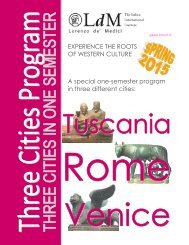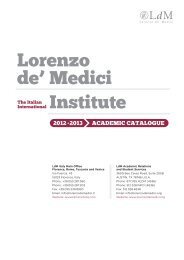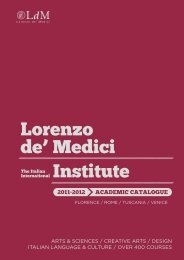aCademiC Catalog 2013-2014 - Lorenzo de Medici
aCademiC Catalog 2013-2014 - Lorenzo de Medici
aCademiC Catalog 2013-2014 - Lorenzo de Medici
You also want an ePaper? Increase the reach of your titles
YUMPU automatically turns print PDFs into web optimized ePapers that Google loves.
Italian through Service Learning (in Italian<br />
only)<br />
ITC 340 F<br />
Cr: 3; Contact hrs: 45<br />
This course, taught entirely in Italian, aims to give stu<strong>de</strong>nts a<br />
singular experience of study abroad. The focus of the course<br />
is both on the Italian learning outcome and the opportunity to<br />
experience and reflect upon community-based volunteer work<br />
in the program city. Stu<strong>de</strong>nts are required to attend weekly<br />
seminars (at least 15 hours) on cultural and language issues,<br />
sharing experiences based on their service learning. Particular<br />
attention will be <strong>de</strong>dicated to socially engaged subjects<br />
like ethnicity and immigration, youth and volunteer work,<br />
children and school, stereotypes and intercultural relations,<br />
globalization. The course also entails volunteer placements in<br />
organizations engaged in socially meaningful tasks: working<br />
with women, children, the el<strong>de</strong>rly, stu<strong>de</strong>nts, immigrants, cultural<br />
associations, disabled people and the environment (at least 15<br />
hours of on-site activities per semester to be arranged by and<br />
starting from the fourth week of the semester). The service<br />
learning will be supervised by the professor and local tutor(s).<br />
Please consi<strong>de</strong>r that stu<strong>de</strong>nts will have to <strong>de</strong>vote additional<br />
hours for in<strong>de</strong>pen<strong>de</strong>nt learning, preparation and follow-up<br />
of the activities and transport. Stu<strong>de</strong>nts will reflect on their<br />
learning through case study reports and journals based on<br />
participation and observation in the service learning location.<br />
Prerequisites: ITL 202 3-Credit Italian Language Intermediate 2<br />
or equivalent; placement test upon arrival<br />
High Renaissance and Mannerism (in Italian<br />
only)<br />
ITC 345 F<br />
Cr: 3; Contact hrs: 45<br />
This course, taught entirely in Italian, traces the major trends<br />
of Italian art in the sixteenth century. It is a period dominated<br />
by the achievements of Leonardo da Vinci, Raphael and, above<br />
all, Michelangelo. These three artists are examined in great<br />
<strong>de</strong>tail. This analysis is not confined to their works of art, but<br />
also inclu<strong>de</strong>s their personalities and the social framework<br />
within which they lived and worked. Great emphasis is<br />
therefore put on the dual themes of patronage and the social<br />
position of the artist in the period. Titian, in Venice, receives<br />
similar attention with particular emphasis on his portraits. The<br />
course also explores the complex and refined style known as<br />
Mannerism - a style held to have emerged from ten<strong>de</strong>ncies<br />
present in Michelangelo’s work. Mannerist art is particularly well<br />
represented in Florence in the works of Pontormo, Bronzino<br />
and Cellini. Stu<strong>de</strong>nts learn to i<strong>de</strong>ntify and examine in <strong>de</strong>tail the<br />
works of the leading artists of the period, and gain the ability<br />
to discuss High Renaissance and Mannerist <strong>de</strong>velopments of<br />
major subjects and genres, such as portraiture and the nu<strong>de</strong>.<br />
Prerequisites: ITL 301 3-Credit Italian Language Advanced 1 or<br />
equivalent; placement test upon arrival<br />
Career Italian – Becoming a Translator (in<br />
Italian only)<br />
ITC 350 F<br />
Cr: 3; Contact hrs: 45<br />
This course, held in Italian, is geared toward stu<strong>de</strong>nts motivated<br />
to learn the translating process from English into Italian with a<br />
strong emphasis on different written genres. Solid knowledge of<br />
both languages is required. This class focuses on both theoretical<br />
and practical aspects of translating text by providing the basic<br />
principles and techniques that should be used when producing<br />
a translation. After a preliminary introduction to the problem<br />
of non-equivalences at different language levels, stu<strong>de</strong>nts will<br />
then explore the diversity of grammatical and lexical categories<br />
across languages as well. Translating skills will be encouraged<br />
through the comparison of different texts in both English and<br />
Italian versions. Practice will inclu<strong>de</strong> a wi<strong>de</strong> range of translated<br />
texts and studying comparisons between sources such as:<br />
newspaper and magazine articles, mo<strong>de</strong>rn short stories,<br />
contemporary novels, screenplays for the film dubbing industry,<br />
famous musicals and songs, scientific and technical translation<br />
for medicine, legal and business purposes, extracts from travel<br />
gui<strong>de</strong>s, art and architecture books, comic strips, menu and<br />
cooking manuals, advertising and web translations.<br />
Note: Please note that the translations are from Italian into<br />
English, therefore high proficiency in written and read English<br />
is expected<br />
Prerequisites: ITL 202 3-Credit Italian Language Intermediate 2<br />
or equivalent; placement test upon arrival<br />
Contemporary Italian Politics (in Italian only)<br />
ITC 370 F<br />
Cr: 3; Contact hrs: 45<br />
Politically, Italy is a country that combines a very old tradition<br />
with passionate <strong>de</strong>bate about the current direction of the<br />
government and the state. The course, taught entirely in Italian,<br />
aims to provi<strong>de</strong> stu<strong>de</strong>nts with an overview of contemporary<br />
Italian politics by exploring its history from the end of the Second<br />
World War to the present day. Stu<strong>de</strong>nts will be encouraged<br />
to broa<strong>de</strong>n their un<strong>de</strong>rstanding and sharpen their political<br />
thinking through engagement with the complexity of the<br />
Italian political landscape. A series of specific historical issues<br />
will be analyzed, such as the rise of mass political parties, the<br />
postwar economic miracle, women’s right to vote, the political<br />
<strong>de</strong>bate among parties during the Cold War, the terrorism of<br />
the Seventies, the instability of <strong>de</strong>mocracy and the interference<br />
of the Mafia, the case of Bribeville (Tangentopoli), reform of<br />
the electoral system, the power of Berlusconi, and finally<br />
the unsolved question regarding the political integration of<br />
immigrants. Primary materials (newspapers, magazine articles<br />
and vi<strong>de</strong>os) will be utilized as a basis for class discussion.<br />
Prerequisites: ITL 301 3-Credit Italian Language Advanced 1 or<br />
equivalent; placement test upon arrival<br />
Italian through Children’s Literature (in Italian<br />
only)<br />
ITC 400 F<br />
Cr: 3; Contact hrs: 45<br />
This course, taught entirely in Italian, explores the most<br />
important children’s books written in Italy. In our country this<br />
genre only established itself firmly at the beginning of the<br />
19th century. Until then, children usually read foreign books<br />
translated into Italian. Beginning with a general introduction<br />
on literature for children, the course will be <strong>de</strong>dicated to the<br />
analysis of the most popular Italian children’s books. Readings<br />
will inclu<strong>de</strong> works by Collodi, Salgari, De Amicis, Vamba, Gianni<br />
Rodari and Bianca Pitzorno. By the end of the course, stu<strong>de</strong>nts<br />
should be able to have a better un<strong>de</strong>rstanding of children’s<br />
literature and they will be familiar with the structure and main<br />
themes of a book written for children. They will also practice<br />
their ability to improve reading and un<strong>de</strong>rstanding a text in<br />
Italian.<br />
Prerequisites: ITL 301 3-Credit Italian Language Advanced 1 or<br />
equivalent; placement test upon arrival<br />
Masterpieces of Contemporary Italian<br />
Literature (in Italian only)<br />
ITC 410 F<br />
Cr: 3; Contact hrs: 45<br />
This course covers 20th century Italian literature, concentrating<br />
on the period 1900 - 1945. During each class, taught entirely in<br />
Italian, the professor will introduce a topic and then will help<br />
stu<strong>de</strong>nts read and comment on the texts. Each stu<strong>de</strong>nt will<br />
also be required to <strong>de</strong>velop an individual project based on the<br />
analysis of a complete work by a 20th century Italian author.<br />
At the end of the term, each stu<strong>de</strong>nt will submit a written<br />
paper and give an oral presentation in class about his/her own<br />
work. Readings inclu<strong>de</strong> works by authors such as Gabriele<br />
D’Annunzio, Giovanni Pascoli, Marino Moretti, Guido Gozzano,<br />
Filippo Marinetti, Aldo Palazzeschi, Dino Campana, Fe<strong>de</strong>rigo<br />
Tozzi, Italo Svevo, Luigi Piran<strong>de</strong>llo, Giuseppe Ungaretti, Vasco<br />
Pratolini, Eugenio Montale, Elsa Morante, Pierpaolo Pasolini,<br />
Alberto Moravia, Italo Calvino, Alessandro Baricco, Niccolò<br />
Ammanniti, and Simona Vinci. The course objective is to foster<br />
the stu<strong>de</strong>nts’ ability to interpret and un<strong>de</strong>rstand a literary text<br />
conceived in a different language and in a different cultural<br />
environment.<br />
Prerequisites: ITL 301 3-Credit Italian Language Advanced 1 or<br />
equivalent; placement test upon arrival<br />
School of Italian Language & Culture FLORENCE<br />
LdM Aca<strong>de</strong>mic <strong>Catalog</strong> <strong>2013</strong>-<strong>2014</strong><br />
127





